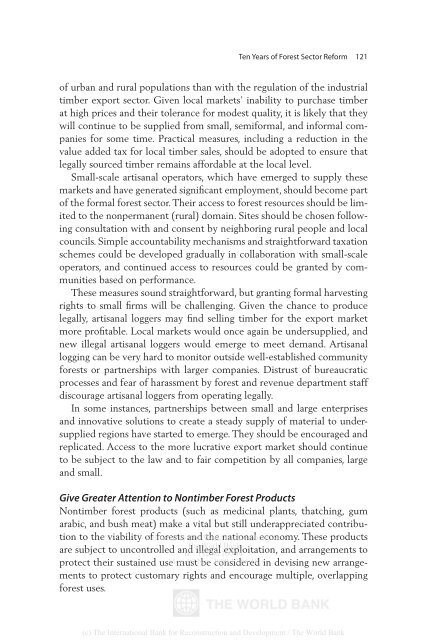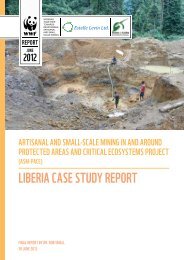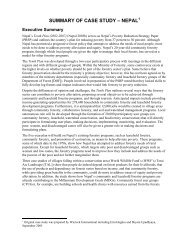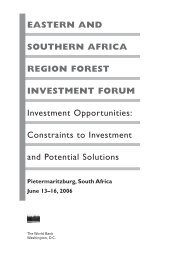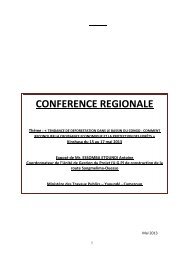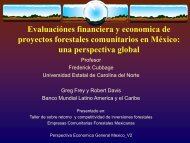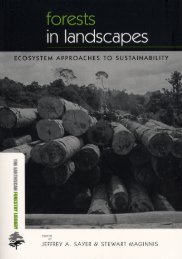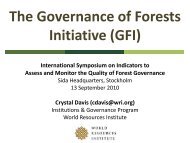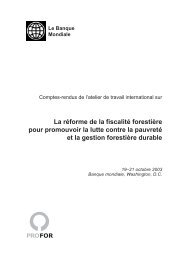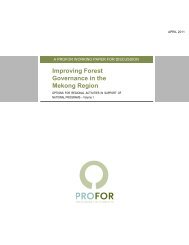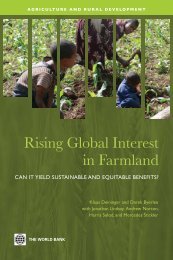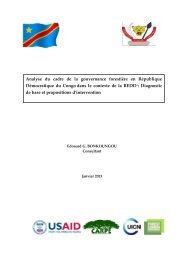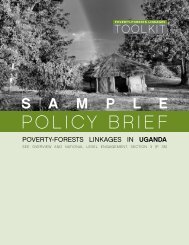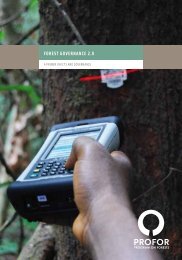The Rainforests of Cameroon - PROFOR
The Rainforests of Cameroon - PROFOR
The Rainforests of Cameroon - PROFOR
- No tags were found...
Create successful ePaper yourself
Turn your PDF publications into a flip-book with our unique Google optimized e-Paper software.
Ten Years <strong>of</strong> Forest Sector Reform 121<strong>of</strong> urban and rural populations than with the regulation <strong>of</strong> the industrialtimber export sector. Given local markets’ inability to purchase timberat high prices and their tolerance for modest quality, it is likely that theywill continue to be supplied from small, semiformal, and informal companiesfor some time. Practical measures, including a reduction in thevalue added tax for local timber sales, should be adopted to ensure thatlegally sourced timber remains affordable at the local level.Small-scale artisanal operators, which have emerged to supply thesemarkets and have generated significant employment, should become part<strong>of</strong> the formal forest sector. <strong>The</strong>ir access to forest resources should be limitedto the nonpermanent (rural) domain. Sites should be chosen followingconsultation with and consent by neighboring rural people and localcouncils. Simple accountability mechanisms and straightforward taxationschemes could be developed gradually in collaboration with small-scaleoperators, and continued access to resources could be granted by communitiesbased on performance.<strong>The</strong>se measures sound straightforward, but granting formal harvestingrights to small firms will be challenging. Given the chance to producelegally, artisanal loggers may find selling timber for the export marketmore pr<strong>of</strong>itable. Local markets would once again be undersupplied, andnew illegal artisanal loggers would emerge to meet demand. Artisanallogging can be very hard to monitor outside well-established communityforests or partnerships with larger companies. Distrust <strong>of</strong> bureaucraticprocesses and fear <strong>of</strong> harassment by forest and revenue department staffdiscourage artisanal loggers from operating legally.In some instances, partnerships between small and large enterprisesand innovative solutions to create a steady supply <strong>of</strong> material to undersuppliedregions have started to emerge. <strong>The</strong>y should be encouraged andreplicated. Access to the more lucrative export market should continueto be subject to the law and to fair competition by all companies, largeand small.Give Greater Attention to Nontimber Forest ProductsNontimber forest products (such as medicinal plants, thatching, gumarabic, and bush meat) make a vital but still underappreciated contributionto the viability <strong>of</strong> Delivered forests by and <strong>The</strong> World the national Bank e-library economy. to: <strong>The</strong>se products<strong>The</strong> World Bankare subject to uncontrolled and IP : illegal 192.86.100.34 exploitation, and arrangements toprotect their sustained use Mon, must 09 Nov be 2009 considered 17:06:18 in devising new arrangementsto protect customary rights and encourage multiple, overlappingforest uses.(c) <strong>The</strong> International Bank for Reconstruction and Development / <strong>The</strong> World Bank


